How the far right hijacked a teenager’s murder
- Published
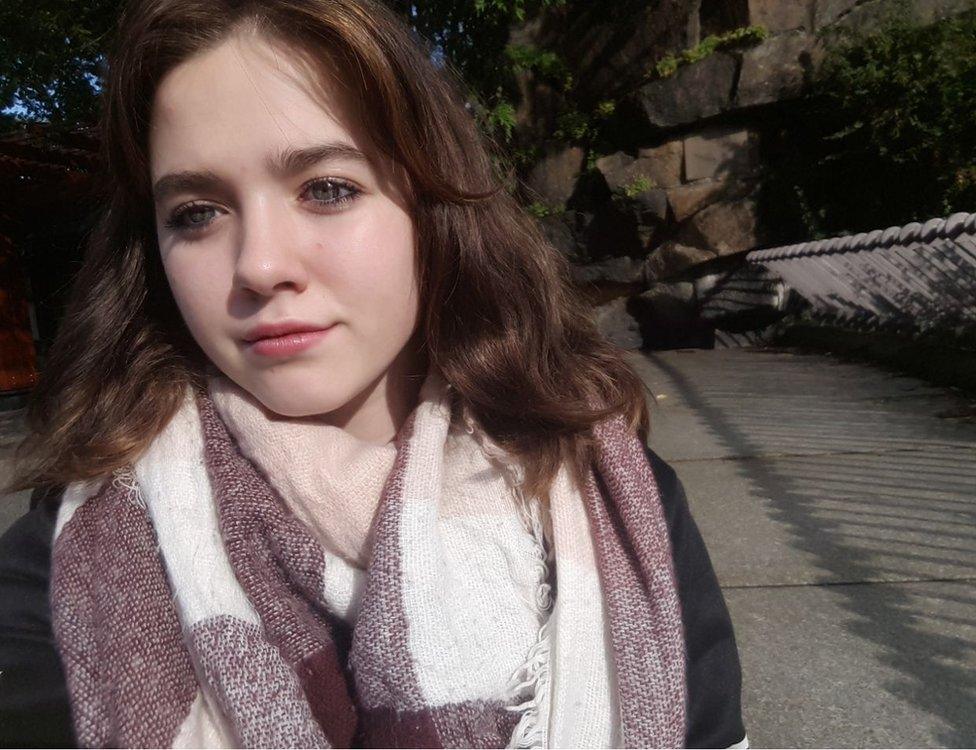
Keira Gross
A year ago, a German teenager was murdered, and her death quickly became a rallying point for anti-foreigner feeling. Rumours circulated online that she had been murdered by a Muslim immigrant. But the truth of what happened was very different from the wild speculation.
Karin Gross lives in east Berlin. On 7 March 2018 she received a phone call at work from her 14-year-old daughter Keira.
"She said to me: 'OK, Mama I'm at home, give me a ring when you are coming back.' So when I finished work I got in my car and phoned her. But she didn't answer."
Karin called again, and again. No one picked up. She sent a WhatsApp message, but it didn't go through. She assumed that the network was down, or that her daughter had turned off her phone to have a nap.
Karin drove home. When she entered her flat, she saw that the living room door was closed.
"That was unusual," says Karin. "I searched the apartment for my daughter. I went to her bedroom. She wasn't in there."
She entered the living room. "I saw her sitting in front of the couch, gagged with a scarf full of blood."
Keira had been stabbed more than 20 times.
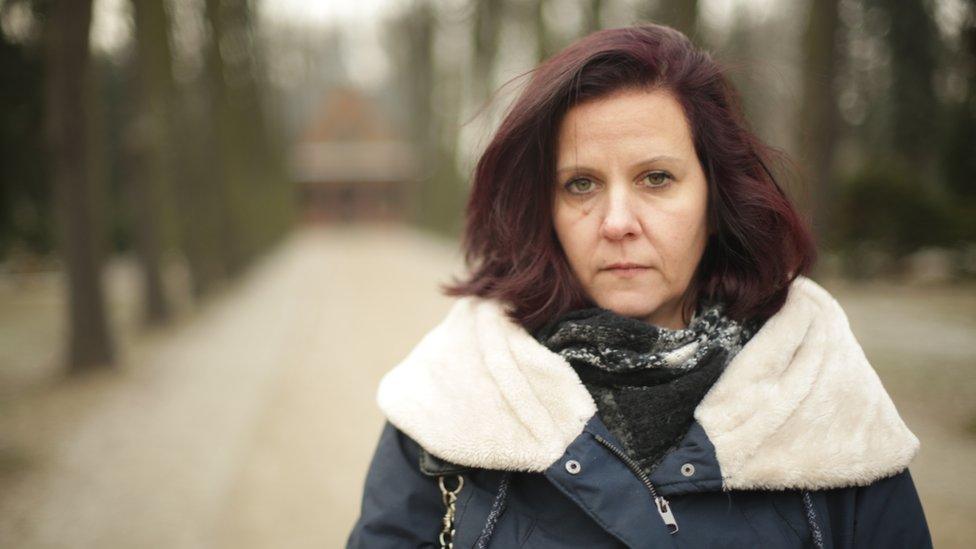
Karin Gross wants people to remember her daughter
Ice skating star
I meet Karin at her lawyer's office on a bitterly cold day in Berlin. She has a naturally cheerful disposition and, under normal circumstances, is quick to laugh.
"The daytimes aren't so bad," she says. The nights are a lot harder.
Karin speaks about the most traumatic experience imaginable with astonishing clarity. She is determined that people understand what losing her daughter has been like.
"I want everyone to remember what happened to her," she tells me.
Keira was a popular, charismatic girl and already an ice skating star in Berlin at 14. Karin was a single mother and Keira her only child.
While the police investigation continued, a very different process was taking place online. Keira's death was swiftly exploited by activists hostile to migrants.
"It only took hours for there to be posts from far-right actors with the hashtag 'Keira' on Twitter and on Facebook," says Oliver Saal, a researcher at the Amadeu Antonio Foundation, an anti-extremism organisation. "Posts appeared about the case suggesting that immigrants had committed this crime.
"The perpetrator was still unknown, and they knew it. But because Keira had been murdered with a knife, (they assumed) it had to be a non-German who had done it.
"Far-right actors claimed that no German could ever do such a thing."
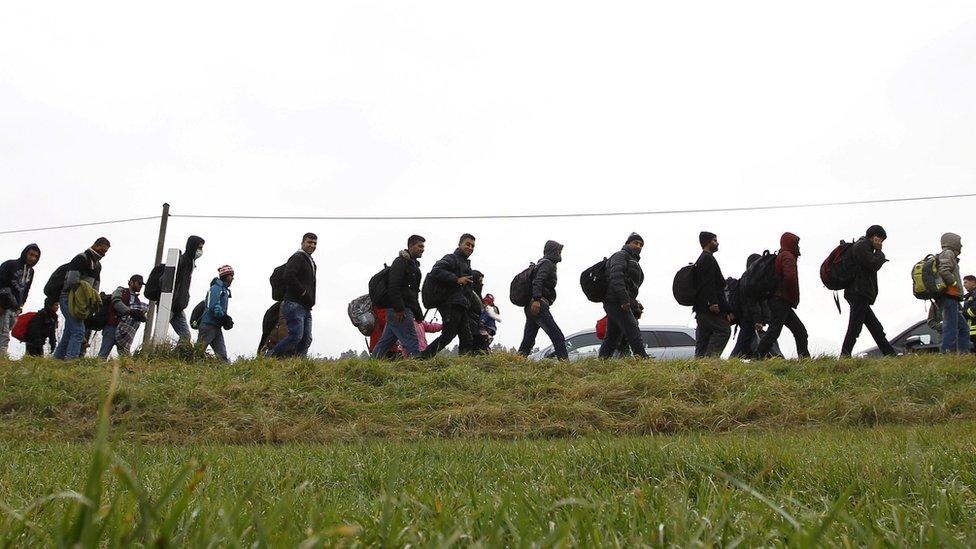
Migrants entering Germany from Austria in 2015
This speculation appeared to confirm the worst fears of many Germans who opposed Chancellor Angela Merkel's decision to accept hundreds of thousands of refugees in the summer of 2015.
Concerns about mass immigration have fuelled the success of the far-right Alternative for Germany (AfD) party, which entered the German parliament as the third biggest party in September 2017.
Keira's death also followed two other widely-discussed murders in Germany: Maria Ladenburger, a student murdered in 2016 by a refugee who claimed to be from Afghanistan; and a 15-year -old girl known as Mia V, who was killed by her Afghan ex-boyfriend in the town of Kandel in 2017.
There has been an increase in crime committed by migrants in Germany since 2015. Some researchers put this down to the high proportion of refugees who are young and male. Young men commit more crimes than any other demographic.
Overall, however, crime in Germany is falling - down to its lowest level since 1992. While violent crime rose between 2014 and 2016, there was a 2.5% decrease between 2016 and 2017.
WATCH: Karin's story
'Beast from the Caucasus'
Four days after Keira's murder, the police announced they had arrested a 15-year-old boy. When the police told Karin the suspect's name, she was shocked.
"I didn't know him personally, but I had heard a lot about him," she says. "Keira had photos in her room of him. She was a little bit in love with him but they were not together. She always spoke about him like he was her brother."
Initially, neither the boy's ethnic or religious background was revealed to the public. Despite this being normal police procedure, posts criticising the authorities erupted across social media.

Pegida supporters marching in Dresden
The criticism leaked into more mainstream politics and media as well.
An AfD state representative in Berlin tweeted asking why the perpetrator's "origin" had not been made public. The editor-in-chief of Bild, the most popular tabloid in Germany, called for the "regular information" about the perpetrator to be revealed.
The suggestion that important information was being withheld from the public fed into a narrative that "the establishment" was covering up evidence of a migrant crime wave.
Oliver Saal says one man played a key role in promoting this conspiracy theory. Lutz Bachmann is the founder of Pegida - otherwise known as the Patriotic Europeans Against the Islamisation of the Occident - a far-right, anti-Islam organisation.
He's now an influential social media personality on the German far right. Following Keira's murder, Bachmann posted online that he knew the identity of the suspect.
He claimed that the culprit was a "beast from the Caucasus", a "Chechen Muslim" and a "former refugee". Chechnya has historically been a source of Muslim immigrants to Germany.
Bachmann posted a picture of a boy online. He included the boy's full name and linked to his Facebook profile. The post was shared widely. The culprit, as far as many of Bachmann's followers were concerned, had been identified.
Except it wasn't him.
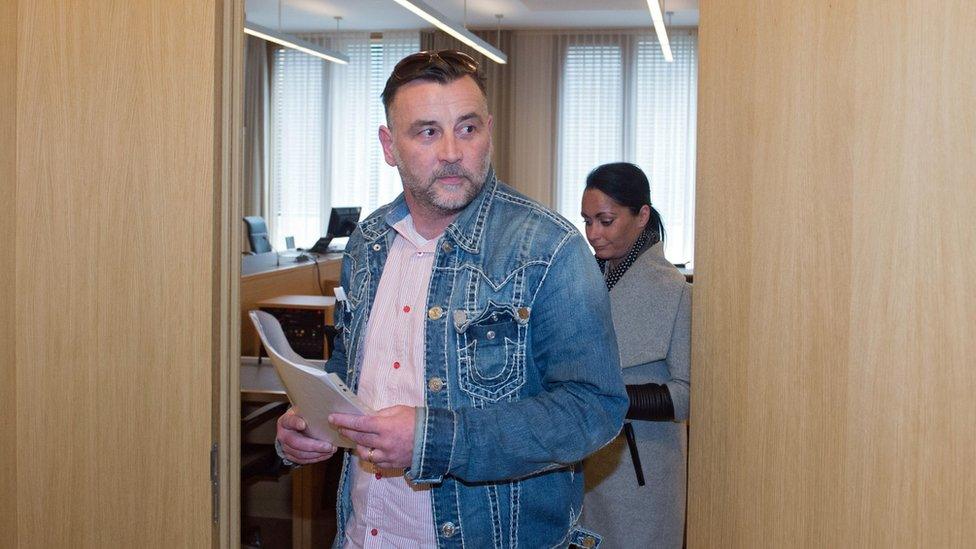
Lutz Bachmann falsely claimed a "Chechen Muslim" was the killer
The boy that Bachmann had discovered online had nothing to do with the crime - he just happened to have the same first name and surname initial as the real suspect.
With posts accusing him of murder proliferating across the internet, the boy made his social media accounts private. The BBC's efforts to contact him were unsuccessful.
We tried to contact Lutz Bachmann through Pegida. They said they had "no interest" in speaking to us.
Bachmann's post was so wide of the mark that the police felt compelled to take the unusual step of responding online. They posted a screenshot of Bachmann's tweet, and called it "fake news".
Allow X content?
This article contains content provided by X. We ask for your permission before anything is loaded, as they may be using cookies and other technologies. You may want to read X’s cookie policy, external and privacy policy, external before accepting. To view this content choose ‘accept and continue’.
In Germany a victim's relatives are entitled to be represented at court proceedings. A few days after Keira's murder, Karin Gross contacted Roland Weber, a well-known criminal lawyer, to represent her.
"This case for me was like a puzzle," says Weber. "We had many little pieces and then, step by step, I began to see the bigger picture."
The boy who had been arrested was neither a refugee nor a Muslim, as Bachmann had claimed.
He was a white church-going German-born teenager, who because of his youth was given the legal pseudonym "Hannes".
"When he was first arrested he told the police a (particular) story," Weber says. "He said that the daughter of my client wanted to commit suicide and that she begged for him to do this for her."
However, Keira's behaviour with friends and family in the days before she died did not suggest that she had been planning to kill herself. Her calendar was filled with plans she had made for the coming months.

Police dismissed the suspect's claims that Keira had been suicidal
As the investigation proceeded, a different picture began to emerge, one which indicated there was a greater degree of premeditation in Hannes' actions than he had first admitted.
Hannes had brought a backpack with him to Keira's home. It contained a change of clothes, gloves and a mask. Some of his schoolmates told police that in the days before the crime Hannes had spoken, in detail, about what he was going to do. In fact, he had even called one of them minutes after the murder to confirm that he had gone through with it.
'The hardest thing in the world'
Karin attended every day of the trial. Hannes sat with his mother on the opposite side of the room.
"I think it was the hardest thing in the world that I have ever been through," Karin says. "I didn't get any regrets or any apologies - not from his family. Nothing. Even when they were talking about what he has done, he didn't apologise. He talked about it like stealing a car."
Teachers described Hannes as a friendly, popular boy, but there was a very different side to his personality.
"He wasn't sure if his friends were real friends," Roland Weber says. "One day he decided that if he couldn't have real friends then maybe it would be better to be the bad guy: the Joker, the opposite character to Batman."

You may also be interested in:

The court heard that for some time before the killing, Hannes had dyed his hair green and even wore white face paint to look like the Joker.
Evidence about his actions after the murder also suggested a chilly detachment.
Knowing that he needed to destroy Keira's phone - so there would be no trace of the WhatsApp messages they had exchanged - he went to a nearby lake and threw it in.
He went home and returned the knife to a block in his parents' kitchen.
Then he turned on his computer and began to play League of Legends.
A court-appointed psychiatrist concluded that there was no indication that Hannes had a personality disorder or a mental illness.
"In the end," Roland Weber says, "all of us - not only the judge, but also my client and me - we were very sure that he just did it for fun. To see how it is when someone is dying."
Hannes was convicted of murder and sentenced to nine years juvenile detention.
The story was very different from the narrative being promoted by far-right activists online. A Berlin police spokesperson told the press that they had "never experienced a murder case being politically exploited in such a way."

Keira was Karin's only child
On a January afternoon, Karin takes me to the cemetery where Keira is buried. She comes almost every day.
Trimming the leaves of an orange rose to lay on the grave, Karin describes how on one visit, a few months earlier, she made a disturbing discovery. Keira's grave had been desecrated.
On the gravestone someone had written the name of the murderer and described him as "Russian." The myth of the "beast from the Caucasus" persisted.
"It was a shock for me," says Karin, "because I never thought there would be someone who would write something like that on my daughter's gravestone.
"For me it doesn't make any difference if it was Russian or Japanese or anything like that," she tells me. "My daughter is still dead."
Karin tried to get rid of the graffiti with water, but it wouldn't come off. She went home to get nail polish remover. Even with that, it took two hours to scrub the marble clean.

Karin still lives in the same flat where her daughter was murdered.
"People wonder how I can bear it," she says. "I haven't changed anything. OK, I have a new couch. But all the blood and evidence of what happened are gone."
"I can't imagine moving away. It was one day that was not good. But there are so many years of memories there."
Recently she has taken her first tentative steps onto the ice at the hall where Keira practised. She wears her daughter's skating clothes.
"They fit me, although we have a different figure - her shoes too," Karin says.
"Perhaps in 10 years I will also be a speed skater. I am just doing it because I want to be near her. I go there to have fun.
"I am not alone. So many friends of hers come ice skating with me. We do it together, in memory of her."
If you need support for mental health issues, advice is available via the BBC Action Line.
Do you have a story for us? Email BBC Trending, external.
More from Trending: Eritrean Press: Reporting on Africa's most secretive state
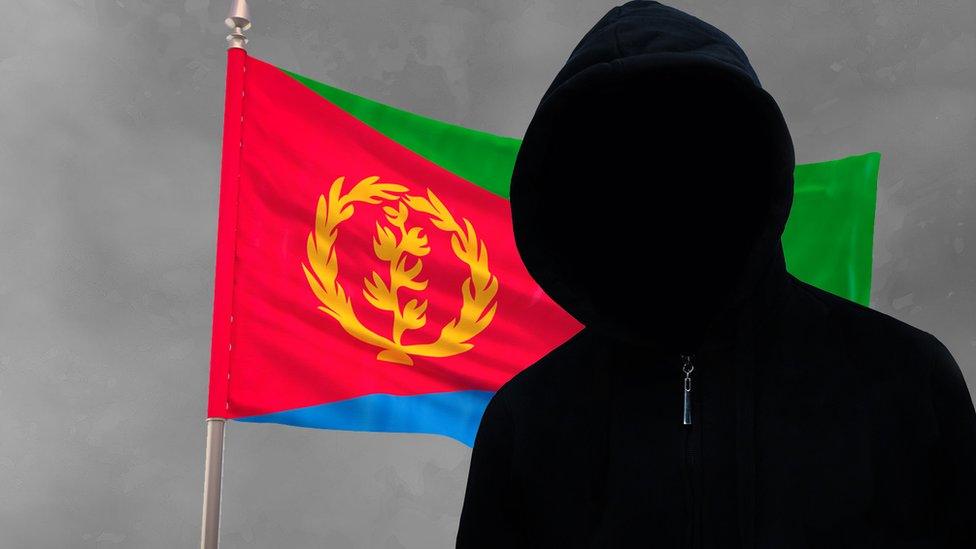
He's the editor of a popular Facebook page that provides news from a country with one of the world's worst records on press freedom. But not even the journalists who write for him know his real identity. READ MORE
You can follow BBC Trending on Twitter @BBCtrending, external, and find us on Facebook, external. All our stories are at bbc.com/trending.